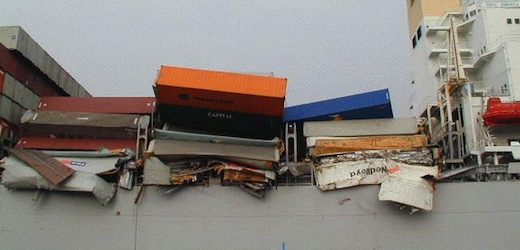
How can you persuade somebody packing containers, possibly a couple of hundred miles from the nearest sea of the need to ensure that the cargo is sufficiently secure to withstand the accelerations and decelerations of an oceanic voyage? The right answer is “with difficulty” as too many of these people don’t even bother to secure the cargo so that it doesn’t shift as the truck navigates the first roundabout or sharp bend on its long haul to the docks.
If you are looking to be shocked, it is worth checking out the road haulage accidents on Facebook, where there are some real horrors, such as the cab on a braking truck being completely carried away by the heavy cargo behind it, which just kept on going. The fate of the driver was unstated, but obvious. There are no fewer than 18,000 “straight line” truck accidents in the US each year, many of which are of this nature, with ill-secured cargo responsible.
If you tell a packer that the trans-Atlantic cargo he is stuffing into a box will be subject to rolling of 30deg. or more, some 160,000 times on an average voyage, will he be impressed and secure the load more diligently, or just mutter “whatever” and slam the doors shut?
Hopefully, the arrival on the scene of the new IMO/ILO/UNECE Code of Practice for Packing of Cargo Transport Units (CTUs) will make a difference to the amount of cargo damage and general mayhem caused by poor packing. Whole stacks of containers collapsing aboard big ships, damage to lifting equipment and fatalities and injuries on all modes of transport and in the docks are the sort of pictures that this code hopes to address, once its lessons are properly promulgated.
The Code is not mandatory, of course, but hope springs eternal and there is some anticipation that individual nations will make it so. And while sceptics might suggest that packers who haven’t bothered for the past forty years may not change their ways, it has been suggested that modern communications, better and more accessible training like e-learning, pocket cards and apps can be used to “translate” the contents of the code to those who need it most.
ICHCA International has been doing some really good evangelism on behalf of the Code with seminars and explanation of this important safety matter under way. Let’s hope this important Code, which provides all the guidance anyone needs to load CTUs safely, will make all the difference
Author: Michael Grey Source: claymaitland.com

